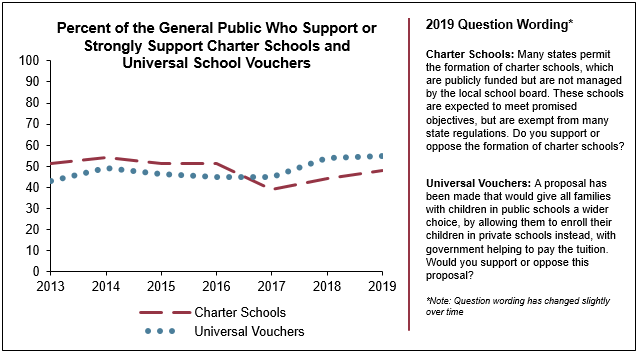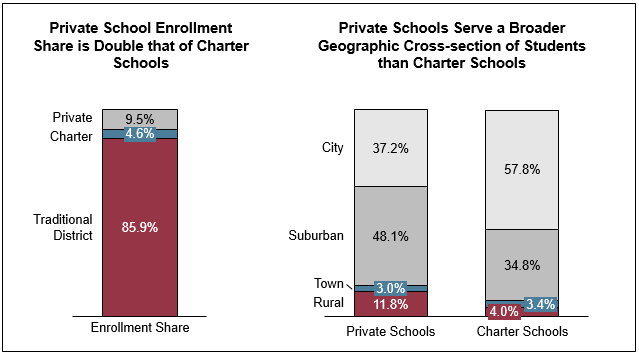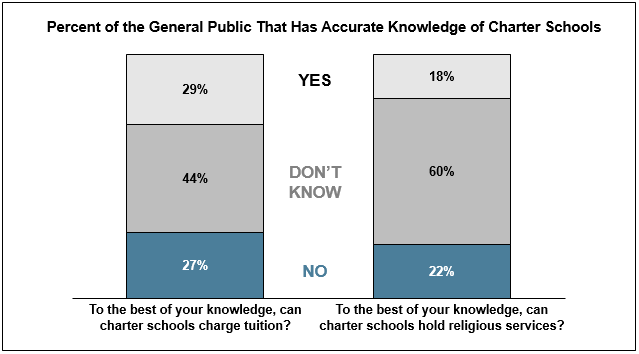Universal vouchers, which provide government funding to families to offset the cost of private school tuition, are generally favored by market-oriented school-choice proponents. So you’d expect charter schools, which tend to enjoy more bipartisan support, to be more widely popular.
According to the latest Education Next poll, in 2019, 55% of the public indicated that they support universal vouchers, an increase of 12 percentage points since 2013. Meanwhile, charter schools only got the support of 48% of the public, a slight decline of 3 percentage points since 2013.

Source: Education Next, “Trends in the EdNext Survey: Question wording and data over time,” 2019, https://educationnext.org/files/ednext-poll-question-wording-over-time-through-2019.pdf
Here are four key lessons from the Education Next poll that might explain why universal vouchers are tracking ahead of charter schools:
First, and most obvious to those in education policy circles, charter schools have been effectively demonized by vocal opponents with big microphones. It’s hard not to attribute the dip in public support between 2016 and 2017 to the ballot initiative to lift the cap on charter schools in Massachusetts, a debate that captured national headlines and pulled down tens of millions of dollars in political donations from both sides. The dip might also be attributed to the elevation of Betsy DeVos as a figurehead of the charter school movement. Support for charter schools has started to bounce back since 2017 and now stands just 3 percentage points below where it was in 2013, but opposition has also grown from 25 to 39 percent — a signal that charter school opponents have been effective in influencing public opinion.
Support for universal vouchers may indicate that more families have considered private schools as an option for their children. Americans’ opinions are shaped by the benefits they perceive for their own families, and private schools are more salient to more families. Private schools have been around since before the nation’s founding. Moreover, families are more likely to have a private school than a charter school in their area. According to a 2017 Brookings analysis, 82% of families have a private school within five miles of their home, compared to 46% for charter schools. Private schools also have double the enrollment share of charter schools and serve a broader geographic cross-section of the country.

Source: National Center for Education Statistics, Digest of Education Statistics, 2018, Table 206.30, https://nces.ed.gov/programs/digest/d18/tables/dt18_206.30.asp?current=yes
Proximity and relevance matter, and survey respondents may be more inclined to support a policy that would help them access a school like the one down the road, rather than the abstract idea of an unfamiliar school in the nearest urban center.
The general public understands vouchers better than they understand charters. The Education Next poll also confirms that the general public’s knowledge of charter schools is generally low and often inaccurate. Just about one in four respondents correctly understand that charter schools are tuition-free or that charter schools are prohibited from offering religious services.
The poll does not assess respondents’ knowledge of universal vouchers, but it’s reasonable to think vouchers enjoy a higher degree of public understanding. First, at least as described in the polling question, the policy mechanism behind universal vouchers is relatively straightforward: the government gives families money to use to offset the cost of private school tuition. Second, the policy mechanism is relatively familiar: the government commonly uses vouchers for social welfare programs like housing and food stamps. It seems reasonable that an individual is more likely to put their support behind something they know a bit about.
Survey respondents may be less likely to oppose vouchers because the polling question names families. It is a semantic difference, but the way the questions are worded may influence the response. The question about universal vouchers is framed as a benefit to families: “give all families with children in public schools a wider choice.” The question about charter schools is framed as a policy innovation: “[P]ublicly funded but not managed by the local school board” and “expected to meet promised objectives, but exempt from many state regulations.” A policy described in terms of benefits to actual people is more likely to pull on the average American’s heart strings than an abstract description of governance structures.
Charter school proponents are wrestling with the implications of increasing polarization and decline in public support for charter schools. The Education Next poll results suggest they should look for advice from their colleagues working on private-school choice.
